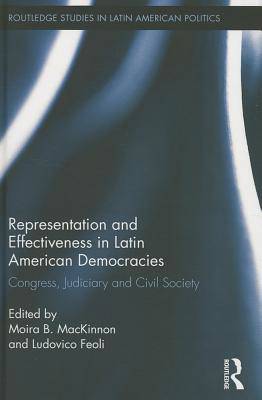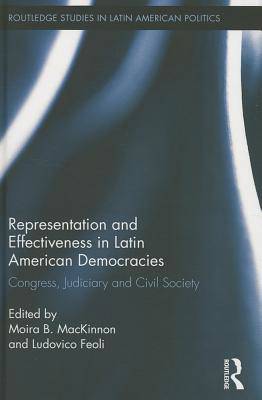
- Afhalen na 1 uur in een winkel met voorraad
- Gratis thuislevering in België vanaf € 30
- Ruim aanbod met 7 miljoen producten
- Afhalen na 1 uur in een winkel met voorraad
- Gratis thuislevering in België vanaf € 30
- Ruim aanbod met 7 miljoen producten
Representation and Effectiveness in Latin American Democracies
Congress, Judiciary and Civil Society
Omschrijving
Legislatures, the judiciary and civil society are important actors in representative democracies. In what ways and how well do they represent? And how effectively do they carry out their institutional and social roles? Both questions refer to the key dimensions of democracy analyzed in this book: representativeness and effectiveness, respectively. While they have been developed separately in scholarly work on institutions and regimes, there is little work considering them simultaneously, and on their interaction. Using quantitative and/or qualitative methods, contributions from top scholars in the field of legislatures, the judiciary and civil society examine these two concepts and their relationships in four Latin American countries: Argentina, Brazil, Chile, and Mexico.
Designed to guide the reader through the complexities of this debate, each expert engages in a larger set of theoretical debates about different approaches to representation in each sphere. In doing so, they debate how effectively these spheres carry out their roles in each country: whether a congress is institutionalized, its accountability, and its performance as a lawmaker; whether a judicial system is independent, carries out oversight, and protects citizen rights; and the role of civil society in a representative democracy.
Representation and Effectiveness in Latin American Democracies
is a timely and welcomed contribution to the to the growing debate about the quality of democracy in Latin America, and the developing world more generally.Specificaties
Betrokkenen
- Uitgeverij:
Inhoud
- Aantal bladzijden:
- 330
- Taal:
- Engels
- Reeks:
- Reeksnummer:
- nr. 6
Eigenschappen
- Productcode (EAN):
- 9780415824330
- Verschijningsdatum:
- 9/05/2013
- Uitvoering:
- Hardcover
- Formaat:
- Genaaid
- Afmetingen:
- 157 mm x 231 mm
- Gewicht:
- 598 g

Alleen bij Standaard Boekhandel
Beoordelingen
We publiceren alleen reviews die voldoen aan de voorwaarden voor reviews. Bekijk onze voorwaarden voor reviews.










